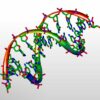Growing up in a community where people with low and high socioeconomic status interact may improve children’s chances of increasing their future economic status. The finding, based on an analysis of approximately 21 billion Facebook friendships in the United States, is published as part of a pair of papers in Nature.
The strength of an individual’s social network and community (their social capital) has been thought to have an important effect in different fields, including economics, health and education. However, measuring social capital has proven to be difficult, with existing studies focusing on relatively small surveys or datasets that cover only specific communities.
Using data from Facebook, Raj Chetty and colleagues constructed and analyzed several distinct measures of social capital for each ZIP code, high school and college in the U.S. The privacy-protected data were based on a sample of more than 70 million Facebook users in the U.S. aged between 25 and 44, and socioeconomic status was determined by combining several measures such as ZIP code median income, cell phone model used and college attended.
The authors found that a measure they term economic connectedness—the proportion of high-socioeconomic-status friends among people with low socioeconomic status—is one of the strongest predictors of upward income mobility identified to date. The authors estimate that if children with low socioeconomic status were to grow up in counties with economic connectedness comparable to that of the average child with high socioeconomic status in the U.S., their incomes in adult life would increase by 20%.
In a second paper, Chetty and co-authors looked to understand what determines these social interactions across socioeconomic status. They distinguish between differences in exposure (the share of high-socioeconomic status individuals a person comes into contact within their schools or in religious organizations) and differences in friending bias—the rate at which people befriend the individuals with high socioeconomic status within their groups. The authors find that about half the social disconnection in the US is driven by lack of exposure (segregation), while the other half is driven by friending bias. The authors provide evidence that friending bias can be reduced through changes in institutional structures and policies.
Using the new measures constructed in these studies, researchers and policy makers could learn from areas that have high levels of social capital and provide assistance to communities seeking to improve economic connectedness and other forms of social capital, they conclude. To facilitate such work, the authors will release statistics on each type of social capital by ZIP code, high school and college in the US publicly at www.socialcapital.org.
More information:
Raj Chetty et al, Social capital I: measurement and associations with economic mobility, Nature (2022). DOI: 10.1038/s41586-022-04996-4
Raj Chetty et al, Social capital II: determinants of economic connectedness, Nature (2022). DOI: 10.1038/s41586-022-04997-3
Provided by
Nature Publishing Group
Citation:
Kids’ friendships could influence their future economic status (2022, August 1)



